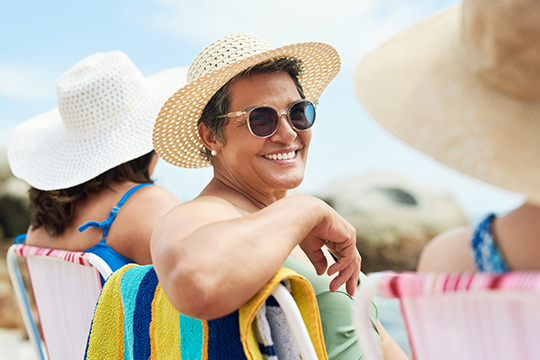
From heat exhaustion to backyard pool hazards, aging requires extra precautions outdoors.
Summertime may mean the living is easy, but, for older adults, it’s also potentially risky. From heat exhaustion to backyard pool hazards, aging requires extra precautions outdoors. Here’s some of what you need to know.
Heat and you
Almost 600 people died in British Columbia because of last summer’s extreme temperatures, according to the B.C. Coroners Service. Of those who died, 69 per cent were 70 or older.
The numbers are a vicious reminder that heat and aging don’t always mix well.
“If you cannot remove heat from your body effectively, body temperature goes up (and can reach) a certain critical level,” says Ira Jacobs, a professor in the University of Toronto's Faculty of Kinesiology. The result can be anything from cramps to possible fatal heat stroke.
Even gardening on a hot day can cause problems. Our bodies cool themselves in part through blood vessel dilation, which transfers internal heat to the skin, where it becomes sweat and disperses with evaporation. However, the body still needs heat to function, so the heart has to work harder to move more blood to the skin and the muscles, potentially edging you closer to your maximum safe heart rate while you’re hoeing that vegetable plot.
“If you sense your heart rate going up (abnormally), you’re better to slow down,” Jacobs says. “You could be putting yourself in a risk zone for a serious injury.”
Another problem: As we age, we sweat less, which means we're less able to dissipate body heat. Instead of wiping away the perspiration, let it and the heat evaporate, Jacobs suggests.
He says aging bodies are also less able to recognize how hot or dehydrated they are, one reason for the high death rate among elderly people during heat waves.
To stay safe while exercising and working outdoors in the heat, Jacobs says to stay hydrated, don brimmed hats, wear clothing that wicks away sweat and reduce exposure to the sun — for instance, look for shade when walking.
Nasty insects
Lyme disease, transmitted by blacklegged ticks found in long grass and wooded areas, can be nasty. Severe joint pain and impaired muscle movement, the latter sometimes emerging years after infection, are among the possible effects. Climate change is helping spread tick-borne diseases, including Lyme, according to the Public Health Agency of Canada.
Retirement can mean more time gardening, hiking and other activities where ticks congregate. Covering up with clothing and applying DEET-based insect repellant will help keep the critters at bay. Check your provincial ministry of public health for more information on Lyme disease.
While there’s little evidence that Lyme disease has deleterious outcomes for seniors in particular, West Nile disease is more dangerous for those over 50 and people with weakened immune systems, according to the federal government. Transmitted by mosquitoes and varying in confirmed cases from year to year, the disease can, in rare cases, lead to severe and sometimes long-term illness, including memory loss.
Covering up your body and your head (with a wide-brim, UV-resistant hat), using insect repellant and removing mosquito breeding spots such as standing water in your backyard can decrease the risk of infection.
Sunny ways may be hazardous
Without the sun, there’d be no life as we know it. But the sun can also be the enemy of seniors, according to Jason Rivers, a medical director at Vancouver’s Pacific Derm dermatology clinic and past president of the Canadian Dermatology Association.
He explains that our skin accumulates damage over the years from sun exposure. If we spend more time outdoors after retiring, the damage can accelerate.
“Our skin has the ability to repair itself, but as we get older, our repair mechanisms work less well, so that cumulative damage is adding up faster than the skin can repair it. Eventually, if you’re fair-skinned and have enough sun and enough damage, it can turn into skin cancer.”
Rivers says covering up, staying in the shade during the hours of peak sun intensity from 11 a.m. to about 3 p.m. and using a sunscreen that protects against both UVA and UVB rays and has an SPF rating of at least 30, are ways to reduce skin damage.
He adds that there’s some evidence that taking 500 milligrams of vitamin B3 (nicotinamide) twice daily can reduce the risk of certain skin cancers.
Safe swimming
A backyard pool doesn’t just cool us off. For seniors, it can also improve arthritis symptoms, help maintain bone health in women and heighten general fitness. But, with the Royal Life Saving Society Canada reporting that people over 65 account for one quarter of all backyard pool deaths, safety is paramount.
What are safe practices? Never swim without someone close by: a sudden cramp or light-headedness could trap you in the water. Pool decks, stairs and ladders get slippery, so go slow. Be careful about swimming during cool spells because we become less resistant to cold as we age. Finally, don’t overdo it: We need to exercise, but an occasional break in the shade is wise

